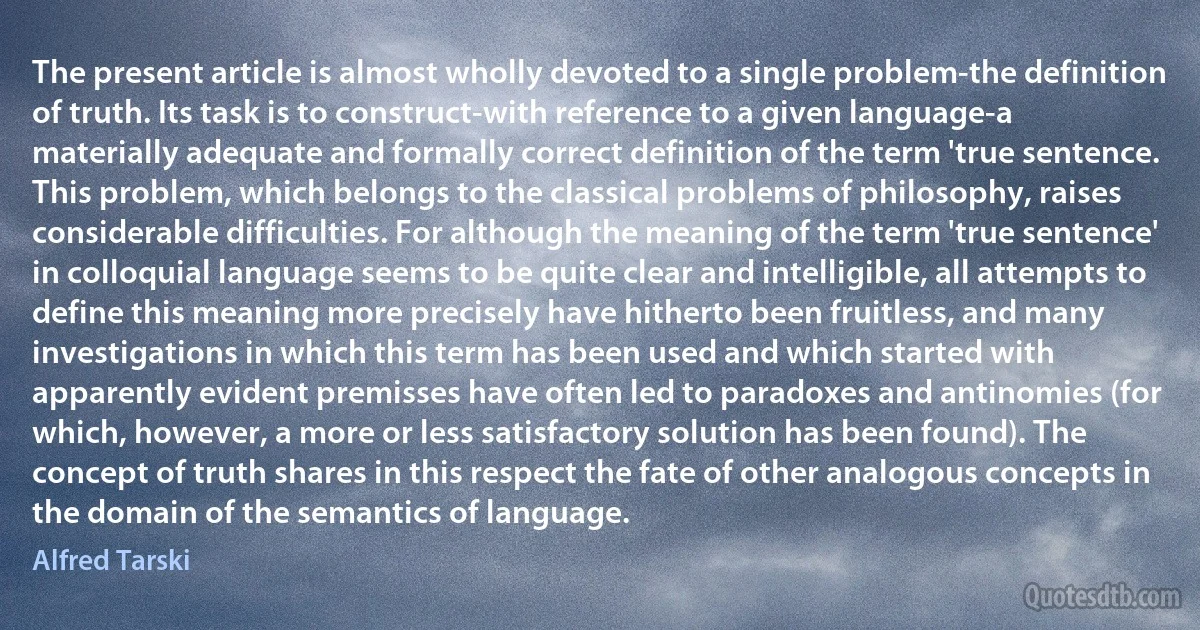
The present article is almost wholly devoted to a single problem-the definition of truth. Its task is to construct-with reference to a given language-a materially adequate and formally correct definition of the term 'true sentence. This problem, which belongs to the classical problems of philosophy, raises considerable difficulties. For although the meaning of the term 'true sentence' in colloquial language seems to be quite clear and intelligible, all attempts to define this meaning more precisely have hitherto been fruitless, and many investigations in which this term has been used and which started with apparently evident premisses have often led to paradoxes and antinomies (for which, however, a more or less satisfactory solution has been found). The concept of truth shares in this respect the fate of other analogous concepts in the domain of the semantics of language.
Alfred TarskiRelated topics
almost article classical clear colloquial concept correct define definition difficulties fate found given language led less meaning present problem quite respect satisfactory single task truth semanticsRelated quotes
Japan had come to terms with Russia because of her difficulties, but this did not mean approval of communism. Communism meant the end of emperor-worship, and feudalism and the exploitation of the masses by the ruling class, and indeed almost everything that the existing order stood for... But communism is the outcome of widespread misery due to social conditions, and unless these conditions are improved, mere repression can be no remedy. There is a terrible misery in Japan at present. The peasantry, as in China and India, are crushed under a tremendous burden of debt. Taxation, especially because of heavy military expenditure and war needs, is very heavy. Reports come of starving peasants trying to live on grass and roots, and of selling even their children. The middle classes are also in a bad way owing to unemployment and suicides have increased.

Jawaharlal Nehru
I have already accepted the policy of Imperial preference...to the effect that a preference will be given on existing duties and on any duties which may subsequently be imposed. On this subject I think there is no difference of opinion between us. ... I am prepared to say that the key industries on which the life of the nation depends must be preserved. I am prepared to say also that, in order to keep up the present standard of production and develop it to the utmost extent possible, it is necessary that security should be give against the unfair competition to which our industries have been in the past subjected by the dumping of goods below the actual cost of production. ... I shall look at every problem simply from the point of view of what is the best method of securing the objects at which we are aiming without any regard to theoretical opinions about Free Trade or Tariff Reform.

David Lloyd George
The first intellectual operation in which I arrived at any proficiency, was dissecting a bad argument, and finding in what part the fallacy lay; and though whatever capacity of this sort I attained was due to the fact that it was an intellectual exercise in which I was most perseveringly drilled by my father, yet it is also true that the school logic, and the mental habits acquired in studying it, were among the principal instruments of this drilling. I am persuaded that nothing, in modern education, tends so much, when properly used, to form exact thinkers, who attach a precise meaning to words and propositions, and are not imposed on by vague, loose, or ambiguous terms. The boasted influence of mathematical studies is nothing to it; for in mathematical processes, none of the real difficulties of correct ratiocination occur.

John Stuart Mill
THEY who are acquainted with the present state of the theory of Symbolical Algebra, are aware, that the validity of the processes of analysis does not depend upon the interpretation of the symbols which are employed, but solely upon the laws of their combination. Every system of interpretation which does not affect the truth of the relations supposed, is equally admissible, and it is thus that the same process may, under one scheme of interpretation, represent the solution of a question on the properties of numbers, under another, that of a geometrical problem, and under a third, that of a problem of dynamics or optics. This principle is indeed of fundamental importance; and it may with safety be affirmed, that the recent advances of pure analysis have been much assisted by the influence which it has exerted in directing the current of investigation.

George Boole
Gandhi had been right. There was only one way to behave, even if it seemed, in the short term, against one's self-interest. Surely it was in one's self-interest in the long term to exhibit generosity, humanity, kindness and a sense of justice to one's fellow men. It was cynicism of Beesley's kind which had, after all, led to the threatened extinction of the whole human race. There could be no such thing s a "righteous” war, for war was by its very nature an act of injustice against the individual, but there could be such a thing as an "unrighteous” war-an evil war, a war begun by men who were utterly corrupt, both morally and intellectually. I had begun to think that it was a definition of those who would make war-that whatever motives they claimed, whatever ideals they promoted, whatever "threat” they referred to, they could not be excused-because of their actions they could only be of a degenerate and immoral character.

Michael Moorcock
